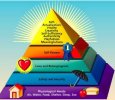Eongar
Dagobah Resident
Concerning the issue of Buddy, only a good communicator that makes the complex simple. I understand you want to broaden the perspective on this or any issue, but maybe it was not the right way, I'm speaking Spanish and it's hard to follow.
On the issue discussed in this post, I developed the idea that it is probable that an aggravating factor in the occurrence of serious psychological disorders has been a change in diet in those days. A body lacks the necessary nutrients and / or the addition of gluten, lectins, etc.. even caused a shift in perception of the life of society at the time. Coupled with the "need" to protect the territories of these societies and other eventualities -emergence of diseases that did not exist before the rise of agriculture, for example-, perhaps we can understand change and worsening of the human condition.
Also the emergence of agriculture and sedentary lifestyle, and therefore the possession of property, caused the appearance of hedonistic vision of life as Lobaczewski wrote:
The fact of having a hedonistic lifestyle in humans causes greed, ambition and a whole range of behaviors harmful to society all together. And while lose interest and concern for the issue of evil. Straight Talk, a hedonistic lifestyle complicates things and causes the loss of the notion of Reality throughout a whole. Hunter-gatherers probably had a broader view and easy living situations and acted better.
On the issue discussed in this post, I developed the idea that it is probable that an aggravating factor in the occurrence of serious psychological disorders has been a change in diet in those days. A body lacks the necessary nutrients and / or the addition of gluten, lectins, etc.. even caused a shift in perception of the life of society at the time. Coupled with the "need" to protect the territories of these societies and other eventualities -emergence of diseases that did not exist before the rise of agriculture, for example-, perhaps we can understand change and worsening of the human condition.
Also the emergence of agriculture and sedentary lifestyle, and therefore the possession of property, caused the appearance of hedonistic vision of life as Lobaczewski wrote:
From time immemorial, man has dreamed of a life in which his efforts to accumulate benefits can be punctuated by rest during which time he enjoys those benefits. He learned how to domesticate animals in order to accumulate more benefits, and when that no longer met his needs, he learned to enslave other human beings simply because he was more powerful and could do it.
Dreams of a happy life of ‘more accumulated benefits’ to be enjoyed, and more leisure time in which to enjoy them, thus gave rise to force over others, a force which depraves the mind of its user. That is why man’s dreams of happiness have not come true throughout history: the hedonistic view of ‘happiness’ contains the seeds of misery. Hedonism, the pursuit of the accumulation of benefits for the sole purpose of self-enjoyment, feeds the eternal cycle where good times lead to bad times.
During good times, people lose sight of the need for thinking, introspection, knowledge of others, and an understanding of life. When things are ‘good,’ people ask themselves whether it is worth it to ponder human nature and flaws in the personality (one’s own, or that of another). In good times, entire generations can grow up with no understanding of the creative meaning of suffering since they have never experienced it themselves. When all the joys of life are there for the taking, mental effort to understand science and the laws of nature – to acquire knowledge that may not be directly related to accumulating stuff – seems like pointless labor. Being ‘healthy minded,’ and positive – a good sport with never a discouraging word – is seen as a good thing, and anyone who predicts dire consequences as the result of such insouciance is labeled a wet-blanket or a killjoy.
Perception of the truth about reality, especially a real understanding of human nature in all it’s ranges and permutations, ceases to be a virtue to be acquired. Thoughtful doubters are ‘meddlers’ who can’t leave well enough alone. “Don’t fix it if it ain’t broke.” This attitude leads to an impoverishment of psychological knowledge including the capacity to differentiate the properties of human nature and personality, and the ability to mold healthy minds creatively.
The cult of power thus supplants the mental and moral values so essential for maintaining peace by peaceful means. A nation’s enrichment or involution as regards its psychological world-view could be considered an indicator of whether its future be good or bad.
During good times, the search for the meaning of life, the truth of our reality, becomes uncomfortable because it reveals inconvenient factors. Unconscious elimination of data which are, or appear to be, inexpedient, begins to be habitual, a custom accepted by entire societies. The result is that any thought processes based on such truncated information cannot bring correct conclusions. This then leads to substitution of convenient lies to the self to replace uncomfortable truths thereby approaching the boundaries of phenomena which should be viewed as psychopathological.
The fact of having a hedonistic lifestyle in humans causes greed, ambition and a whole range of behaviors harmful to society all together. And while lose interest and concern for the issue of evil. Straight Talk, a hedonistic lifestyle complicates things and causes the loss of the notion of Reality throughout a whole. Hunter-gatherers probably had a broader view and easy living situations and acted better.



